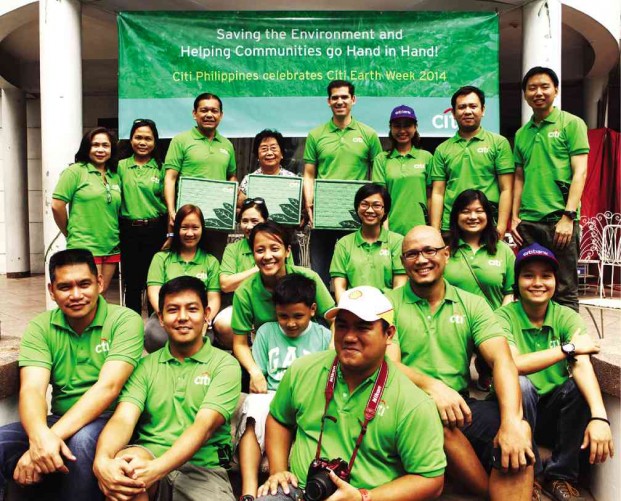
SIANTURI (last row, third from left), Osorio (last row, fourth from right) and Silva (last row, fourth from left) with the Citi volunteers.
Volunteers from the country office of one of the world’s largest financial institutions, Citibank Philippines, marked Earth Week this year by helping a few urban poor women make a little money to fund some of their projects.
Led by chief executive officer Batara Sianturi and country human resources head Jorge Osorio, the volunteers spent several hours recently turning old newspapers into shopping bags.
The bankers were instructed and supervised by women beneficiaries of the Families and Children for Empowerment and Development Foundation Inc. (FCED), an affiliate of Childhope Asia Philippines (CHAP), then worked side by side with them, weaving rolled newspaper pages into bags, painting them and attaching straps.
Chap is a non-profit, non-political and non-sectarian organization that helps and supports street children. FCED pursues a holistic approach, bringing together government and non-government organizations and volunteers in community-based services to promote social and economic development in Manila’s depressed areas. Both non-government organizations pursue programs to help marginalized urban families, particularly children and women.
Teresita Silva, Chap founder and executive director, put the bag-making exercise, which seemed far removed from caring for the environment, in perspective.
“Caring for the environment and helping communities go hand in hand,” she said.
The bag-making project does not only turn what would otherwise be trash into something useful again but also gives several poor urban women a means of livelihood to augment the family income.
Aileen Y. Barrios, FCED livelihood coordinator, said bag-making was just one of several income-generating skills she had taught women in about 35 barangay (villages) in Manila.
To prepare for their day of bag-making with the FCED women beneficiaries, Sianturi said Citi volunteers conducted a newspaper recycling drive to collect enough materials for their almost day-long activity.
The bags made by Citi volunteers would be sold and the money used by FCED to help fund its livelihood projects for women.
Citi volunteers divided themselves into groups to work on the different phases of the job. Volunteer Karen Nuestro’s 8-year-old son Damian helped in all phases of production—from rolling newspaper pages and weaving them to attaching the straps. He apparently understood well the purpose of the whole exercise: “When you help the earth, it makes everyone happy.”
Sianturi and Osorio seemed to have enjoyed learning a new skill that they joked they would now have a new career option should they decide to leave banking.
They expressed admiration for the passion of the women, who were instructing them on how to turn old newspapers into a completely new product, in pursuing a livelihood to supplement the family income.
Silva said Citi had supported CHAP for several years now. “Your (Citi’s) support over the years has made it possible for us to help street children and their families in two of the most important aspects of our program: financial education and vocational training. Both are very crucial because these are the programs that help them move from being abandoned and dependent to becoming more self-reliant and contributing members of our society,” she said.
Aside from shopping bags, CHAP and FCED beneficiaries also turn old newspapers and other discarded paper into wine caddies, tissue holders, coin purses and cellular phone cases. The items are sold by Gifts and Graces, an e-commerce website, which taught the women how to recycle paper.
The bags, which are strong enough to carry weights of up to 10 kilograms, are also available in Kultura in SM malls and Rustans.
Barrios said what the women earned helped pay for food and the children’s school expenses, among others.
Annie Abo said bag-making helped her family make ends meet when her husband was jobless.
Sianturi says he welcomed initiatives that helped save the environment, provide economic opportunities to low income families and promote a culture of service among Citi employees.
He underscored the importance of caring for the environment. The devastating impact of calamities, like Supertyphoon Yolanda, he said, “makes sustainable initiatives important.” He also stressed that protecting the environment required a lot of commitment.
Sianturi said recent natural disasters were caused mainly by society’s negative impact on the environment. “How we treat the environment is closely linked to the cause of poverty and the problems we encounter with street children in urban areas such as Metro Manila,” he said.
Citi began celebrating Earth Week worldwide in 2006. During this time, Citi seeks to promote sustainable initiatives as well as draw attention to joint efforts with community partners toward sustainable development.